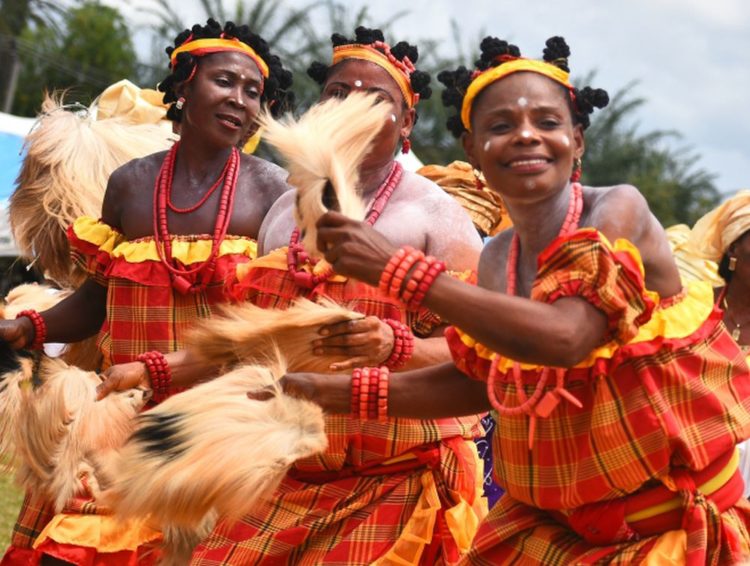At the sound of tyres screeching hard on the tarred one-lane road linking Akugom and Usaja – two small villages in Ugep, an urban town in Nigeria’s southern Cross River State – a group of little girls playing under an almond tree turn sharply to see 25-year-old Lilian Ubi as she alights from her halted Hyundai car branded “Miss Leboku”.
Ubi smiles and waves smartly at the girls staring at her with lingering admiration.
“I never knew it would get as good as this,” she said.
Five kilometres away at Emenko, another village, 46-year-old Elizabeth Nsot – a smallholder farmer – is still in disbelief that a branded mini truck parked at the front of her home belonged to her.
“For three good days, I never believed it. I was just wondering whether people would come and say they wanted to take the car away,” she said. “But the car is mine,” she added, smiling.
Ubi and Nsot were 2020 winners of two of several components introduced in 2005 into Ugep’s “Leboku”, an ancient yam festival that uses performing arts to celebrate the harvest of new yams every August.
Saving yams
Nestled in central Cross River, 123.3 km (72 miles) away from Calabar, the state capital, Ugep kingdom with an estimated population of less than 500,000 people prides itself as the largest native town in West Africa by land mass.
But this location has not always been the home of the Ugep people. Local historians say before the 16th century, the people occupied a part of Akamkpa town in southern Cross River called “Ume-en”.
However, following a conflict with their neighboring “Akpa” town, the people of Umen-en were driven away from their land until they arrived at Ugep and settled there.
“From the 16th century or so, we have been living here,” says Cornelius Ikpi Edet, a retired teacher and the Okpebili (spokesperson) of Ugep.
The historian said when the people arrived in Ugep, their first attempt at cultivating the land brought bountiful harvests of yams that helped quell their hunger.
Since then, every August to September – the period for harvesting new yams – the people embarked on a month-long festival celebrating yams as a hunger killer.
During Leboku, colourful beauty contests and performing arts appear, including dance, music, and wrestling. Young women of marriageable age come out to be chosen by young men for marriage. Older Ugep men and women also use the chance to teach the younger ones the value of agriculture in tackling hunger.
Going global
In August 2003, Ubi Ujong Inah, Ugep’s king till 2015, invited Donald Duke, the then Cross River State governor, to observe Leboku. Duke honoured the invitation, attending with top state culture and tourism ministry directors.
Known for developing tourism projects like the Obudu Cattle Range and Tinapa, Duke and his directors reviewed the history, message, and the assortments of activities Ugep people used to keep the festival from monotonous and concluded that the festival had the potential to become a global tourism attraction if well marketed.
Duke then appointed one Ekpenyong Ojoi, then assistant director at the state Ministry of Culture and Tourism, as a desk officer in charge of marketing Leboku.
“When we had the script of that festival, we discovered that apart from half-clothed young men and girls dancing with heavy legs wearing bangles in celebrating yam, they bring their maidens to be chosen for marriage,” said Ojoi.
“In celebrating yam, they wrestle to show their energy. In celebrating yam, they open the farm roads (for agricultural expansion). We saw in all that a rich culture.”
The state then set out to achieve two things to take Leboku forward. The first was to encourage greater participation from the youth of Ugep, and the second was to attract the attention of tourists from other parts of Nigeria and beyond.
To boost participation, the state government introduced the Mr and Miss Leboku contest, where a young lady and a young man are chosen as king and queen after emerging winners in a highly competitive intellectual and dance competition. It also introduced the Best (yam) Harvester contest in 2008.
While the star prize winners of Mr and Miss Leboku get a branded new car worth over each worth N7.5 million (over $17,000) each, the top Best Harvester receives a mini truck worth N4 million (about $9,000).
“For us, the queen (Miss Leboku) is the daughter of a farmer who knows the story of why the woman should farm and why the man should farm. Who knows how the Yakurr (Ugep’s ethnic language) people survived the hunger of those years,” Ojoi said.
To market Leboku beyond the town, in 2005, the government secured N22 million ($137,667 then) sponsorship from Africa’s biggest telecommunication company, MTN, for that year’s celebration.
It then christened the festival “Leboku International”, listed it for the first time as one of the state’s yearly tourism events, and promoted it using the media.
Just two years after, these efforts began to pay off. Government officials from other Nigerian states, local and foreign photographers, documentary film producers, tourists, scholars and a team from Google Africa started visiting the town yearly to observe and document the festival.
For example, an associate professor of Art History at Pacific North College of Art in the US, Gitti Salami, spent between 2006 and 2011 researching and publishing research works on Leboku.
Economic impact
There are pieces of evidence that the rebranding of Leboku has brought economic and infrastructural improvements to Ugep and its people. The town now has government-led improved road networks that have sparked the proliferation of small and medium-sized businesses that create employment.
For example, until 2005, there was no decent functional hotel in Ugep. But today, there are more than 15 hotels in the town.
There was also no tertiary institution in the town before 2005. Today, it hosts the Institute of Technology and Management, built by the state in 2013 and managed by UK-based Hubrry College. The federal government also approved the siting of a federal polytechnic in Ugep, which started operations in 2021.
These developments have positioned Ugep as the destination for people migrating from neighbouring towns for business, job search and education.
Consumption equals industry
Nigeria’s economy predominantly depends on crude oil extraction, constituting about 90% of its foreign earnings. Experts told Prime Progress that repackaging local cultures like Cross River did with Leboku for international recognition and consumption could drive tourism and ease the economy.
“Our cultures are dying because nobody consumes them,” says Ilami Clive Krama, head of Theater and Film Studies department, University of Port Harcourt. “Consumption is the link between culture and industry.”
But despite the success of Leboku, Ugep people fear that it might be challenging to sustain the progress in the future with the state and MTN as the only sponsors. Except more sponsors emerge, if MTN pulls out in the future and/or a new state administration that does not prioritise tourism takes over, the festival might suffer a blow.
Already, some infrastructures, like road networks the Duke administration built to make Leboku accessible, are wearing out, and successive administrations after Duke’s exit in 2007 have failed to maintain them to standard.
“Leboku needs more partnerships and more sponsorship to sprout with force. Leboku needs more exposure,” said Ubi, the former Miss Leboku.
This story was produced with the support of Nigeria Health Watch through the Solutions Journalism Network, a nonprofit organisation dedicated to rigorous and compelling reporting about responses to social problems.






